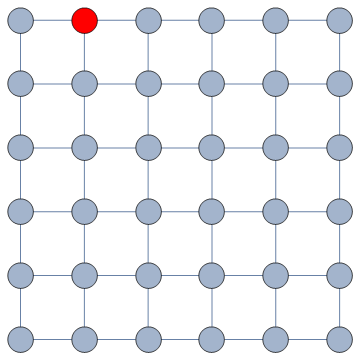Generate random walk on a graph
Block[
{
graph = RandomGraph[{20, 100}]
, start
, path
},
start = RandomChoice[VertexList[graph]];
path = NestList[RandomChoice[AdjacencyList[graph, #]] &, start, 5];
ListAnimate[
Table[
Graph[graph
, VertexStyle -> {v -> Red}
, VertexSize -> Large
]
, {v, path}
]]]

Block[
{
graph = GridGraph[{6, 6}]
, start
, path
},
start = RandomChoice[VertexList[graph]];
path = NestList[RandomChoice[AdjacencyList[graph, #]] &, start, 30];
ListAnimate[
Table[
Graph[
graph
, VertexStyle ->
Append[Map[Rule[#, Pink] &, Union[path[[1 ;; v]]]],
path[[v]] -> Red]
, EdgeStyle ->
Evaluate[(UndirectedEdge[#1, #2] -> Directive[Red, Thick]) & @@@
Partition[path[[1 ;; v]], 2, 1]]
, VertexSize -> Large
]
, {v, Length[path]}
]]]

If you need good performance (e.g. compute hundreds of long random walks to get good statistics), consider using IGRandomWalk from the IGraph/M package.
rg = RandomGraph[{100, 200}]
walk = IGRandomWalk[rg, 1, 100]
Animate[
HighlightGraph[rg, vertex],
{vertex, walk}
]
You can use DiscreteMarkovProcess.
For example,
graph = GridGraph[{5, 5}]
mp = DiscreteMarkovProcess[1 (* starting vertex index, not name *), graph]
walk = RandomFunction[mp, {1, 10}]["Values"]
(* {1, 2, 1, 6, 11, 16, 11, 12, 7, 2} *)
Animate:
Animate[
HighlightGraph[g, vertex],
{vertex, walk}
]
Performance comparison with IGRandomWalk from IGraph/M:
RandomFunction[mp, {1, 10000}]; // RepeatedTiming
(* {0.034, Null} *)
IGRandomWalk[graph, 1, 10000]; // RepeatedTiming
(* {0.00038, Null} *)